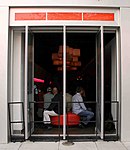Wardman Row
Apartment buildings in Washington, D.C.District of Columbia Inventory of Historic SitesNeoclassical architecture in Washington, D.C.Residential buildings completed in 1911Residential buildings on the National Register of Historic Places in Washington, D.C. ... and 1 more
Washington, D.C. Registered Historic Place stubs

Wardman Row is a block of historic apartment buildings at 1416-1440 R Street, NW in Washington, D.C. The buildings, located in the Greater Fourteenth Street Historic District were designed in 1911 by Harry Wardman and Albert Beers. In 1984, the buildings were placed on the National Register of Historic Places.
Excerpt from the Wikipedia article Wardman Row (License: CC BY-SA 3.0, Authors, Images).Wardman Row
R Street Northwest, Washington
Geographical coordinates (GPS) Address Nearby Places Show on map
Geographical coordinates (GPS)
| Latitude | Longitude |
|---|---|
| N 38.912222222222 ° | E -77.033888888889 ° |
Address
R Street Northwest 1436
20009 Washington
District of Columbia, United States
Open on Google Maps








